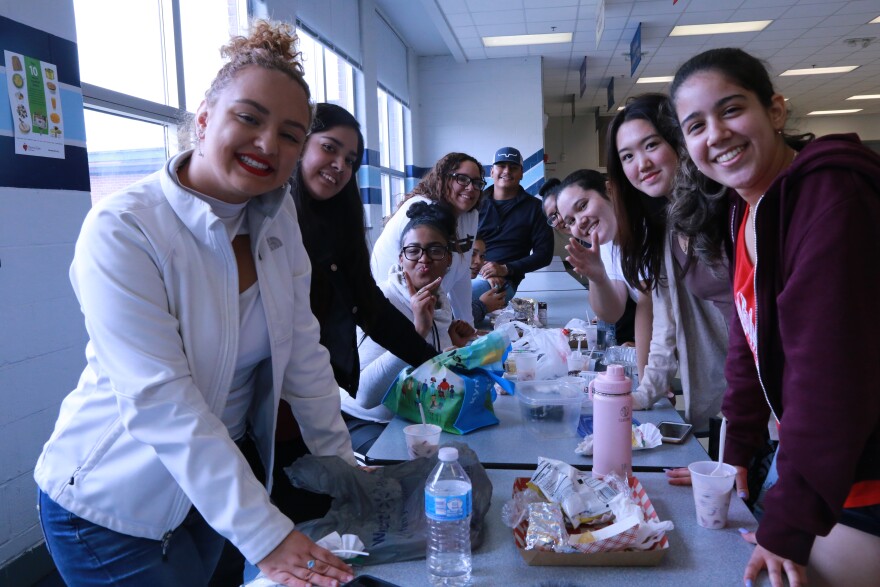Seventeen-year-old Helen Taura says she thought her classmate Lianay Gutierrez Luque looked familiar when they met at a new interpreter training offered this June. It wasn’t until the last hour of the eight-day course that they put it together.
"I saw her and I was just like, 'I know her from somewhere. I don’t know where,'" Helen explained. Then it clicked. "I used to interpret for her."
Turns out, Helen and Lianay (pictured above) were friends in second grade. They met, both times, through interpreting. When Lianay first moved to Louisville from Cuba when she was eight years old, she didn't speak much English. She needed help, and Helen was the only other Spanish speaker in her grade at Farmer Elementary.
"We did 'show and tell' and she brought in a toy but she couldn’t talk to anyone about it, so the teacher brought me in," Helen remembers.
Helen’s family is also Cuban, but she was born in Louisville and has been fluent in English and Spanish her whole life. She's also been interpreting for as long as she can remember. Within a year, Lianay picked up English and was soon interpreting for others too.
Many first generation Americans share this common experience of being called on to interpret English for others from a young age. Maybe a parent needs extra assistance at a doctor's office, or a classmate could use a helping hand. Bilingual kids often step up in a pinch. Jefferson County Public Schools is working to nurture that skill, by offering bilingual teens like Helen and Lianay free training in interpreting.
JCPS Hopes To Build Pipeline Of Interpreters
More than 35 million adults in the United States speak a language other than English at home. A growing number of them also speak English, but even non-native English speakers who are fairly proficient in the language may need assistance in formal settings.
But, sometimes, being called on to interpret for a family member can put a bilingual person in an awkward situation.
Helen remembers interpreting for her parents at her own parent teacher conferences as a little kid. She says she was a good student, so she never felt tempted to twist her teachers’ compliments, but the situation isn't ideal. Although children are sometimes asked to interpret for family at doctor's offices or their own school meetings, it's not best practice.
Any institution that receives federal funding — like a hospital or school — is required by Title VI of the 1964 Civil Rights Act to make reasonable accommodations to provide interpreters when needed. But a lack of qualified interpreters or funding means that doesn't happen in every situation.
With more than 130 languages spoken at JCPS, the district has a big need for interpreters at parent teacher conferences, school open houses and events.
Giselle Danger is the Student Equity and Community Engagement Coordinator at JCPS. She says she hopes some of the students in the new program will become interpreters for the schools in the future.
"We want to create our own pool, because we need it," Danger said. "So that is the beauty of this program, is bringing inclusion to the bilingual community."
Danger has dreamed about starting a training program at JCPS for years. She’s a Cuban refugee herself, and in her life, she has both received interpreting services and been an interpreter. She saw the value in teaching students to interpret, because she knows they’re already doing it — just not as well as they could.
"A lot of people assume that because you can speak multiple languages you can be an interpreter. But it takes certain skills," Danger said.
Skills like ethics and best practices, skills that take training. Under Danger’s leadership, JCPS offered that training to a select group of students this summer, at no charge. The class included rising juniors, seniors and recent graduates. Many of the 18 students speak Spanish, but others speak Arabic, Korean and Somali.
Few other school districts offer a program like this.
"It’s something that I think school districts should be looking at. But I don’t believe it’s very common, certainly not across the country," said Madalena Sanchez Zampaulo, with the American Translators Association.
"From the school district’s perspective, I think this is actually really smart," Zampaulo said. "They know that these languages already exist within their school districts and they already have trouble communicating with families that speak these languages."
And for the students, this could be a career path they hadn’t considered, or a new avenue to volunteer their talents.
"For other people in the community who don’t have language access, they’re really doing the community at large a service here," Zampaulo said.
Helen and Lianay say they’re excited to do more interpreting out in the community, and might even use their skills as a side gig when they head to college. In the meantime, they both say that if Giselle Danger called them up to help with a school event, they’d be there.
"I would love to use this new skill set as much as possible," Helen said.
"I would definitely be down to do interpreting like, anywhere," chimed in Lianay.
Luckily, it’s a skill they will carry with them everywhere.






